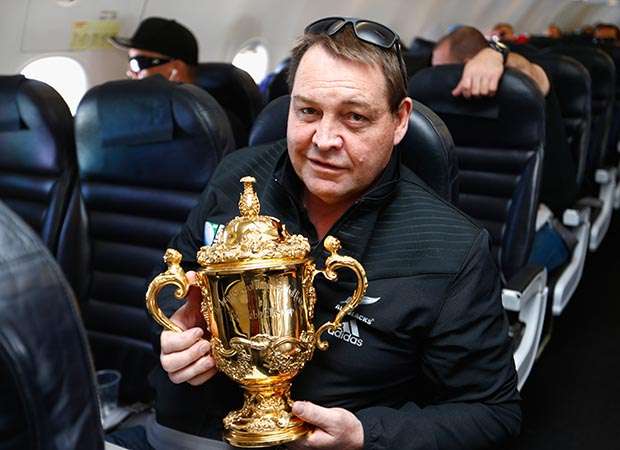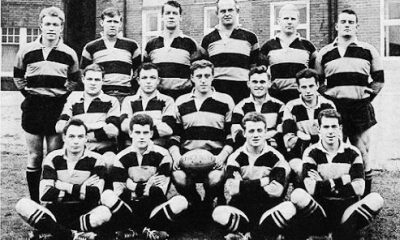
 As head coach of the All Blacks, Steve Hansen has lost three Test matches in five years. In the same position with Wales, he once lost ten on the trot in nine months.
As head coach of the All Blacks, Steve Hansen has lost three Test matches in five years. In the same position with Wales, he once lost ten on the trot in nine months.
The facts rather expose all the mythological guff spouted about Wales being a great rugby nation on a population par with New Zealand. If there is a political analogy to be drawn from his journey to the extremes of failure and success, then Hansen can truly be said to have gone from Jeremy Corbyn to Abraham Lincoln.
There is another striking difference between the countries in terms of expectation. Wales, perennially unable to beat the Southern Hemisphere, lose in the quarter-finals of the World Cup and give their coaches four-year contracts en masse.
New Zealand win the whole caboodle and all Hansen gets as head honcho is another two years.
Now that the Kiwis believe their man has delivered (52 Test wins, two draws, three losses), Hansen has been given an extension to cover the Lions and the next World Cup. Again, they made him prove himself in the wake of all those retirements last October and Hansen has kept delivering.
Over his career, nothing compares to what he had to prove during that first year in Wales – that he could actually win a game that mattered. Results were so damning that some might have given it up as a bad job and headed home.
Others would have been given their cards. Andy Robinson got his in return for presiding over eight England defeats in 2006. Ireland‘s Declan Kidney went four games without a win and suffered the same fate seven years later.
Wales, not noted for tolerating a losing coach, remained in unusually forgiving mood with Hansen until his run reached double figures. Only then did they take him aside and spell out the facts of life.
Hansen’s unflinching response to the crisis explains to some extent why he stands head and shoulders above the rest today as the most successful international coach of the lot.
That is saying something but one of those at the sharp end of the recurring Welsh defeats under Hansen thinks it was the making of him. A full-strength Wales had been roasted on an August afternoon by England’s second-string in a fixture supposed to raise morale just before the 2003 World Cup in Australia. Gareth Llewellyn, a second row who stood the test of time long enough to stretch his 92 Tests over three decades, remembers it well.
“Steve had picked his team for the last of the warm-up matches against Scotland which included a few fringe players,” Llewellyn said. “I was in it. Our understanding of what happened was that David Moffett (WRU chief executive) went to Steve and said:
“‘You need to win this game. Your job is not safe so you need to change the team you’ve picked’.
“Steve made his position clear – ‘I’ve picked that side and that’s the side I’m going to play. I’m 100 per cent behind the players’.
“What I admired about him was the way he stuck to his guns. Even when he realised the consequences, he didn’t panic. We won and Steve hasn’t looked back from that day to this.”
Measured against those who have stood the test of time, notably Sir Clive Woodward, Bernard Laporte, Warren Gatland and Henry, Hansen stands out. He, alone, did almost all his losing in one fell swoop.
Between November 2002 and August 2003, Wales played New Zealand (twice), Italy, England (twice), Scotland, Ireland (twice), France and Australia and lost every one. Hansen got it out of his system, even if there were casualties along the way.
It was more than coincidence that a group of senior players, including Scott Quinnell, retired before the gruff Kiwi left Wales at the end of a three-year apprenticeship. Llewellyn has nothing but praise for him.
“Steve was a very straight talker who knew what he wanted from a group of players who didn’t really understand what he was talking about,” he said. “There were never any grey areas. Maybe for some, he was too straight.
“He had a great sense of humour. There were two amazing things about him: One, he created such a good environment within the camp that we loved turning up for training. Despite the results, we loved being there.
“Two, during that losing run, he never let it show that he was under pressure which he must have been. He had total faith in his convictions. It was a case of: ‘We are going in this direction because this is the right way to go’.
“He gave us a vision. We understood it and bought into it because it made sense. And he was a great bloke away from rugby, something it took others a long time to appreciate.
“A lot of people will look at the quality of the All Blacks and say: ‘If I was their coach, I would have won 52 out of 57 same as Hansen’. Those who say that are under-estimating Steve’s ability, the way he challenges people to get the best out of them.
“What he has done is the stuff of legend and there’s more to come. He’s 57 now and still not a grey hair on his head. You can only talk from personal experience but Steve was the best coach I had by some distance. He, Scott Johnson and Andrew Hore worked really well together, a fantastic coaching group.
“He must be the only Wales coach in the last 20 years to leave of his own accord. He said he was under contract until the end of the 2004 season and that he would be there to see it out.
“There is no doubt that he laid a lot of the foundations for the first of the Grand Slams in 2005. You compare Steve’s achievements – two World Cups and the chance of one more to come – with those of other outstanding coaches and he blows them out of the water.”
Hansen will be 60 and a suitable case for the Monopolies Commission when he finishes cleaning up with the All Blacks. Perhaps by then Wales will have made him an offer he cannot refuse.


British and Irish Lions
Henry Pollock’s rise to stardom continues with 2025 British and Irish Lions selection

British and Irish Lions
Maro Itoje named British and Irish Lions captain for tour of Australia























You must be logged in to post a comment Login